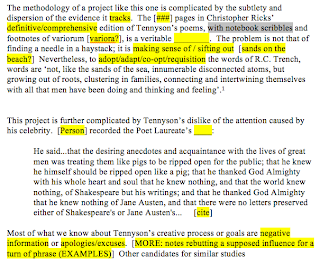 |
| This is what you get for taking a cat nap near your friends. |
Will I be this way when it comes time for me to submit? All I can say is I hope not. My closest academic friend/colleague here is a guy named Ian, who's at my college and doing a related topic. I said to him the other day, "When it's our turn, we'll have to --"
"-- have a suicide pact?" he completed. Uh, no. I was going to say "keep each other sane", but you know, failing that...
So in the spirit of airing one's anxieties rather than letting them ferment and foment, I thought I'd lay out some of my concerns as I stare down the straightaway to "finishing" (i.e. giving up on) my dissertation. Things that are particularly worrying given that it's my fourth year include (but are not limited to) the following:
The Anxieties
- I still haven't read volume 3 of Tennyson's poems, and I definitely need to re-read vol. 2 in great detail. As a result...
- I still don't know which poems to talk about in detail. I have amassed a large number of tiny examples sprinkled across many, many poems. How do I avoid just listing them?
- A lot of the most interesting stuff seems to happen in poems that he either didn't publish, fixed up before he did (thereby deleting the interesting things), or that generally weren't big hits. Partly to counteract that, I've got a "greatest hits" chapter, meaning...
- I'm going to have to talk about In Memoriam, about which there are a lot of books, some of which already have chapters about philology.
- While the biographical and thematic connection of philology to Tennyson and poetry in general is pretty easy to prove, I'm struggling to say anything about his actual work that is different from what you'd say about any poet. Poets like to play with language; that's why they're poets. It catches your notice when, say, T. turns a noun into a verb, but when he writes of "the blackness round the tombing sod", is that because of the idea that nouns are the most solid part of speech? And even if the answer is yes, you don't need to be an amateur philologist to think that.
 I think that's all the big stuff.
I think that's all the big stuff.What has struck me as I talk to people about their work is how we each have our own methods of producing the same basic thing. Even though their approaches don't generally affect how I proceed, I always come away inspired to get back to work. For example, a chat with Ian about the anxieties above sparked some ideas about how to acknowledge them in the introduction. Here it is, a glimpse of what a very early proto-draft looks like for me.
With the years I've come to fear losing any flow of thought, given that they're so rare! Consequently, I put in place-holders and highlight them in yellow so I can't possibly forget to fix them later. Things I'm thinking of deleting I highlight in gray. I confess, it kind of amuses me to see what amounts to an academic MadLib; I wonder whether it would still work if, like when we were children, I filled in every blank with "toilet". Something to keep in mind as a last resort when I'm in a panic at the last minute.
No comments:
Post a Comment